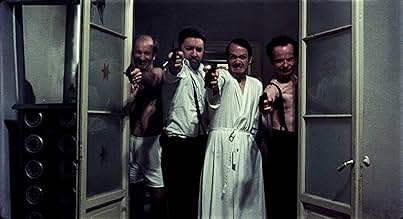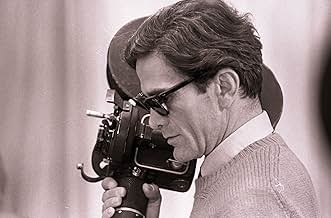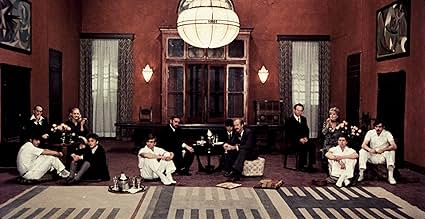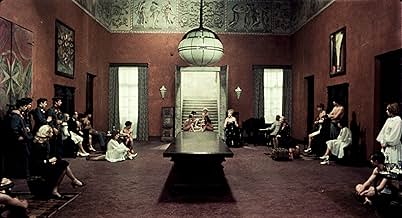
Durante la seconda guerra mondiale in Italia, quattro libertini fascisti raggruppano nove adolescenti e li sottopongono a centoventi giorni di torture.Durante la seconda guerra mondiale in Italia, quattro libertini fascisti raggruppano nove adolescenti e li sottopongono a centoventi giorni di torture.Durante la seconda guerra mondiale in Italia, quattro libertini fascisti raggruppano nove adolescenti e li sottopongono a centoventi giorni di torture.
- Regia
- Sceneggiatura
- Star
- Premi
- 2 vittorie totali
- Eccellenza
- (as Umberto P. Quintavalle)
- Signora Vaccari
- (as Helene Surgere)
Riepilogo
Recensioni in evidenza
Apparently based loosely on the Marquis de Sade's eponymous story, it feels dirty...it feels icky. You will not finish the film feeling happy, relieved, redeemed, or satisfied. You will feel that humanity is capable of terrible things and sometimes for no real reason other than they can. It shows what happens when people blindly follow terrible people and abandoned their own sense of decency. The following orders defense will never work. When you've become an accomplice you ate equally guilty.
This movie has depth, but it's not an easy watch. It's not for a simple eve with a date. I can't imagine watching this with anyone other than fellow film students or a significant other you've been with for years.
*** 1/2 (out of 4)
Nine young boys and nine young girls are gathered up and taken from their homes. They are taken to a secluded castle in Italy during WWII where they hear a variety of perverted stories while their captures sexually and mentally abuse them.
Pier Paolo Pasolini would be murdered before the release of this, his final film and many still seem to think it wasn't a random murder. Many people believe that his politics had some higher ups order his murder but it's doubtful we'll ever know what the truth was. With that said, this final film of his is certainly unlike anything you're ever going to see as it's about as depraved, disgusting and depressing as you're going to get. I personally think SALO, OR THE 120 DAYS OF SODOM is a very good movie but it's hard to really recommend it to anyone.
Based on the work of Marquis de Sade, this film is about as disturbing as everything put to film. The real debate is rather this is some sort of serious art film with a message or is it just a cheap piece of exploitation that was meant to make you sick. I mean, certain horror movies are trashed for their disgusting scenes of violence and sexual brutality but how many movies are actually worse than this one? Not only do you get disgusting stories being told ranging from child rape to people being forced to eat poop but we have to see these things as well. This is a film that really works on the viewers mind so it's going to be up to that viewer whether they take it in as art or some sort of exploitation.
For my money, the film is a piece of art. I'm not going to say what the director was trying to do or say with the picture but to me this film works because it seems very real. It seems like you're really there watching these horrible events and the film really doesn't back down at anything. The stories are rather brutal and we get scenes of such sexual depravity that you can't help but be disturbed. There really isn't any style here because the camera just captures the horrors that are there. The performances are raw, realistic and just add to the horrors of the story.
Obviously, not everyone is going to be able to take this film and I really can't say I'd blame anyone for turning it off. Again, we can debate the politics and message of the film but there's no question that when the end credits start you're going to need a shower.
Lo sapevi?
- QuizDespite the grim subject throughout the film, in an interview on the second disc of the Criterion Collection box set, actress Hélène Surgère claimed the mood was actually rather jovial on the set and that none of the teenage actors were actually harmed or traumatized. She said the abundance of teenagers who had never acted before led the mood to be happy and at times, even fun, with the cast often playing practical jokes on each other. She also said that the movie was literally "made" in the editing room and the filmmakers had no idea how grim a movie it was until they saw the finished product at the premiere.
- BlooperWhen the Duke kisses several victims during Sergio and Renata's wedding, some victims and Ezio begin to laugh, off the character.
- Citazioni
The President: [while eating a meal of feces] Carlo, do this with your fingers.
[the President sticks two fingers in his mouth]
The President: And say, "I can't eat rice with my fingers like this."
Male Victim: [with fingers in his mouth] I can't eat rice.
The President: Then eat shit, you little bastard.
- Curiosità sui creditiEssential Bibliography: Roland Barthes: 'Sade, Fourier, Loyola' (Editions du Seuil); Maurice Blanchot: "Lautréamont et Sade' (Editions de Minuit; in Italy Dedalo Libri); Simone de Beauvoir: 'Faut-il brûler Sade' (Editions Gaimard); Pierre Klossowski: 'Sade mon prochain, le philosophe scélérat' (Editions du Seuil; in Italy SugarCo Edizioni); Philippe Sollers: 'L'écriture et l'experience des limites' (Editions du Seuil)
- Versioni alternativeThe film was rejected for cinema by the BBFC in 1976 and a private showing of the uncut version at the Old Compton Cinema Club in London's Soho resulted in a police raid and confiscation of the movie. A heavily edited version - minus 6 minutes of footage including scenes of torture, homosexuality and excrement eating, and including a 4 minute prologue describing the history of the town of Salo - was later prepared by UK censor James Ferman for club showings. The film was finally passed completely uncut for cinema and video in the UK in December 2000.
- ConnessioniEdited into Histoire(s) du cinéma: Une histoire seule (1989)
- Colonne sonorePrelude in C minor
(uncredited)
Composed by Frédéric Chopin (uncredited)
Played by Arnaldo Graziosi (uncredited)
I più visti
- How long is Salò, or the 120 Days of Sodom?Powered by Alexa
- How was it possible to shoot this movie with kids?
- What was the entire meaning of this film?
- Did anything in this movie happen in real life?
Dettagli
- Data di uscita
- Paesi di origine
- Lingue
- Celebre anche come
- Saló o los 120 días de Sodoma
- Luoghi delle riprese
- Aziende produttrici
- Vedi altri crediti dell’azienda su IMDbPro
Botteghino
- Lordo in tutto il mondo
- 1.808.595 USD
- Tempo di esecuzione1 ora 57 minuti
- Mix di suoni
- Proporzioni
- 1.85 : 1
Contribuisci a questa pagina


![Trailer [OV]](https://m.media-amazon.com/images/M/MV5BYTczYWExODUtNmQ3NC00MzRhLTkwMGQtNzRjM2M5ZGQzYmVkXkEyXkFqcGdeQXRyYW5zY29kZS13b3JrZmxvdw@@._V1_QL75_UX500_CR0)

























